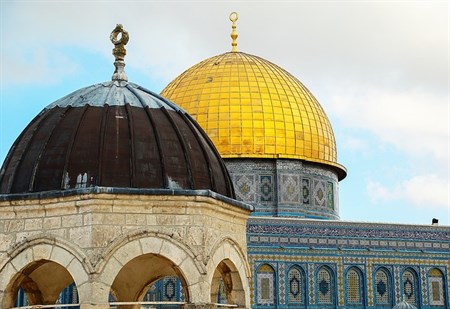Israel: Culture and Tradition
Israel is located along the Mediterranean Sea in the Middle East. The country is surrounded by Egypt, the Gaza Strip, Jordan, Lebanon, Syria and the West Bank. The State of Israel was established in 1948.

Language
Three of the most commonly spoken languages in Israel are Hebrew, Arabic and English. Hebrew is the official language of Israel, while Arabic is widely used by the Arab minority. English is the most commonly used foreign language in the country.
Culture
Israel’s culture is deeply rooted in the Jewish religion. In Israel, there are many Jewish immigrants from several different countries. As a result, Israel has a dynamic, creative and diverse culture. The holidays and festivals are all based on the Hebrew calendar.
Religion
The majority of Israeli people practice Judaism, which accounts for 74.8% of the Israeli population. Islam is the second most prevalent religion at 17.6%. Christianity, Druze and other religions comprise 8.4% of the population.
Celebrations
There are three important Jewish holidays in Israel: The Feast of Pesach (Passover), the Feast of Shavu’ot (Weeks) and the Feast of Sukkot (Tabernacles). These three festivals have historical and agricultural significance.
- The Feast of Pesach. Pesach means to “pass through” or “pass over” in English. Passover is a celebration of God liberating Jews from slavery in ancient Egypt. The holiday begins on the 15th day of the Jewish month of Nissan.
- The Feast of Shavu’ot. This holiday falls on the 50th day after the Feast of Pesach. There are 49 days or seven full weeks before the holiday starts, which is why people call the holiday “The Feast of Weeks.” It is when the first batch of wheat is harvested and offered to God. Work is not permitted on this day.
- The Feast of Sukkot. This is when people gather to celebrate the harvest festival and to remember the period of wandering when they had to live in temporary dwellings. Sukkot means “booths” in Hebrew.
Family Structure
Israelis are very family oriented. As a patriarchal society, fathers are always the head of the household. A family usually includes the husband and wife, sons and their wives, single sons and daughters, as well as their service assistants and the assistants’ families. A typical Israeli family can include two to three core families and the total number of family members can range from 50 to 100 people. Extended, large families are quite common in Israel.
Meals
Israeli cuisine usually follows kosher protocols, due to the Jewish culture and religion. As a result, pork, shellfish, eggs and milk are prohibited. It is also prohibited to prepare or cook meats, dairy products and eggs in the same pot or container. Hummus, tahini, shawarma, pita bread, kebabs and falafel are some of the most commonly enjoyed foods in Israel.
Summary
Before settling in Israel, Israelis were spread out in many different countries. As a result, Israel has a very unique culture due to the influence its people received from the countries and cultures they previously resided in. Israel is an adventurous, creative and diverse country where you can explore a plethora of exciting cultures and people.
Reference:
https://shalomtaiwanisrael.wordpress.com
https://www.cia.gov/library/publications/the-world-factbook/geos/is.html
